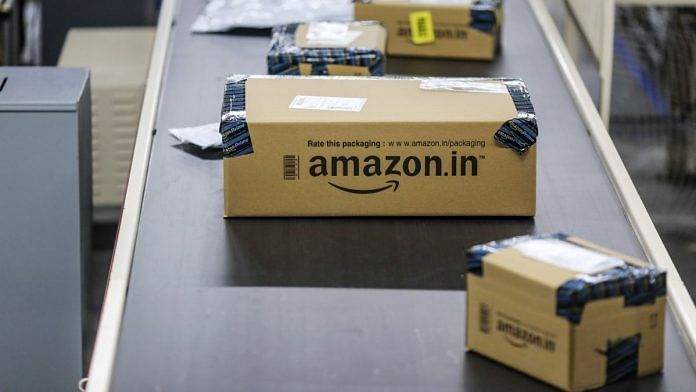New Delhi: With several festivals lined up in the next few months, firms such as Amazon and Flipkart have offered many deals and heavy discounts on products as part of their Great Indian Festival Sale 2020 and the Big Billion Days Sale, respectively.
We asked our readers: Should Amazon-Flipkart festive discounts be banned to protect protesting businesses?
Here is what some of them said:
‘Government needs to take steps for a fair competition’
E-commerce giants Amazon and Flipkart have been able to capture the Indian market smoothly owing to their prompt customer services, creative marketing strategies and heavy discounts. This has proved to be problematic for brick and mortar retailers. Even if traders try to compete with the companies providing such steep discounts, it is a lost battle as these companies not only raise capital through the stock market, but a giant like Amazon India, having an already successful parent company, provides it with financial cushioning to fund such campaigns. So far, the only possible legal route against the companies is to make them comply to the FDI policy. However, the government needs to take further steps to protect the interest of the small retailers by keeping a quota for the amount of discount that can be provided to the consumers, so as to make the competition fair.
 Avni Sharma, Chandigarh
Avni Sharma, Chandigarh
‘Amazon, Flipkart are killing local businesses’
Yes, the festive discounts should be banned because Amazon and Flipkart are not just killing local businesses but also capturing a considerable share of the market. And we are making the rich even richer. Local businesses lose their share, but the government is also not getting anything out of it. Suppose the government cannot wholly ban these kinds of festive discounts. In that case, the government should start charging additional taxes from the online marketplace on the revenue they generate in the festive discount period sale and use them in state welfare.
Pooja Yadav, Hyderabad. Twitter: @PoojaY1301—
‘Local artisans always dependant on local markets’
Indian markets have a cultural connection with the people when you shop locally. Not only do you encourage the local artisans but also get a broader perspective of the rich cultural and heritage diversity you have. Moreover, these people are the most vulnerable to the huge level of tactics played by MNCs. It is not the price but the sustainability of their materials and the artistic craftsmanship, which make each piece a unique one. The network difference between these two competitors is far apart as the artisan has always been dependant on the local markets.
— S.P Srikar Bhattar, Bengaluru. Twitter: @SPSrikarBhatta3
‘Let market forces be given opportunity to adapt to competition’
Slogan of Aatmanirbhar Bharat given by Prime Minister Narendra Modi on one side and the idea of creating a competitive market on the other create a thin line of discussion on festive discounts. Recently, a change was brought in the e-commerce section restricting FDI in inventory-based models, thereby closing gates of the monopolised market. In India, we tend to crosscheck products and prices. E-commerce platforms seem big and vast because of marketing but when compared with real data, the influence is still less. There should be checks and balances with discounts but as I believe India is a nation that won’t sit and order online for festivals. Rest, let market forces be given opportunity to adapt to the competition rather than restricting one side for the sake of another.
— Syed Ali Ashraf, Lucknow. Twitter: @pehle_aap
‘Online sale is still below 5 per cent of total retail sales in India’
Festive discounts from e-commerce giants can’t be banned to protect protesting Indian business. E-commerce giants are often accused of predatory pricing but in reality, online sale is still below 5 per cent of total retail sales in India which consist of thousands of mom-and pop stores, super markets etc. Predatory pricing itself is debatable in free market and it becomes anti-consumerism only when a firm withdraws it and start misusing its monopoly. With benefits such as huge discounts, 30-day return policy, convenience makes e-commerce irresistible and offline retailers should either go online or merge with existing big online players if they want to partake in huge profits that e-commerce brings, as Bill Gates once said, “internet is becoming a town square for a global village tomorrow”.
 Mohit Mathur, Hyderabad. Twitter: @23mohit
Mohit Mathur, Hyderabad. Twitter: @23mohit
‘Government should reduce taxes for small shopkeepers’
Should new renewable energy technology be banned because coal power plant workers are protesting against it? E-commerce has spent years in innovation, thinking smartly and they were prepared for the Covid-19 pandemic. So it is unfair of the government to not allow them to earn their profit. Also, it is unfair to the public who deserve to get cheap, discounted and good quality goods delivered to their homes. If the government wants to do something for small shopkeepers, it should reduce their taxes and end the ‘inspector raj’ system for them. Even shopkeepers should use technology and innovate themselves to survive this crisis.
 Tarush Kakkar, Delhi. Twitter: @KakkarTarush
Tarush Kakkar, Delhi. Twitter: @KakkarTarush
‘Better if rationalised discount rates are fixed’
India’s e-commerce market is growing rapidly. During almost all major festivals, Amazon and Flipkart come up with high discounts. These companies provide platform for their group companies such as Cloudtail, WS Retail as sellers, which provide higher discounts than independent sellers. The Consumer Protection (E-Commerce) Rules, 2020 under the Consumer Protection Act, 2019 prohibits unfair trade practices by entities and sellers and manipulation of price. These higher discounts are actually price manipulation but rules are unclear as to what constitutes manipulation of price. These adversely affect Indian businesses, especially retailers. It will be better if rationalised threshold limits for discount rates are fixed.
 Balaji Misal, Pune. Twitter: @balajimisal
Balaji Misal, Pune. Twitter: @balajimisal
‘Markets should be left free, traders need to adapt to challenges’
It will be a loss to the Indian consumer if the Government of India bans the festive sales by Amazon or Flipkart. Millions of Indian consumers may benefit from the discounts offered by the e-commerce companies, ultimately governments should function in the larger interest of the public and not succumb to the pressure of trader bodies. It’s not only counterproductive for the larger economy but these types of arbitrary interventions will also send a wrong message to investors across the world and force them to think twice before investing in India. The markets should be left free and traders need to adapt to the new challenges rather than resort to demands for bans.
 Vidyuth Chikoti, San Francisco. Twitter: @followvidyuth
Vidyuth Chikoti, San Francisco. Twitter: @followvidyuth
‘It is time the government takes its hand off free markets’
Every decade we promise we would be at the forefront of innovation, but when challenged to put our money where our mouth is, we run for the big brother’s embrace and bow our heads at the altar of this welfare state’s soup kitchen. It is time the government took its hand off the free markets, and treated us like adults.
 Raghavendra Dinesh Pasupuleti. Twitter: @prd6001
Raghavendra Dinesh Pasupuleti. Twitter: @prd6001
‘Banning discounts could be overstepping’
That Indians are price conscious is evident by popularity of the Big Billion Days and the Great Indian Festival Sale of Flipkart and Amazon, respectively. Supply chains owned by Amazon-Flipkart have comfortably reached rural India. Although digital divide is a hurdle, the disruption of businesses is in progress. Banning the discounts in post-liberalised world could be overstepping. Instead, there could be a three-step solution.
1. Regulation should be on the line of price/discount rate.
2.Similar tie-ups should be incentivised as between Amazon-Flipkart and small businesses to improve their visibility and reach.
3. Creating equitable opportunity and building the ecosystem like GeM in decentralised manner.
 Shruti Wankhade, Paratwada, Amravati, Maharashtra. Twitter: @Shruti84471040
Shruti Wankhade, Paratwada, Amravati, Maharashtra. Twitter: @Shruti84471040
Also read: Reader View: IPL not the same without fans at stadium, but game a much-needed stress buster

